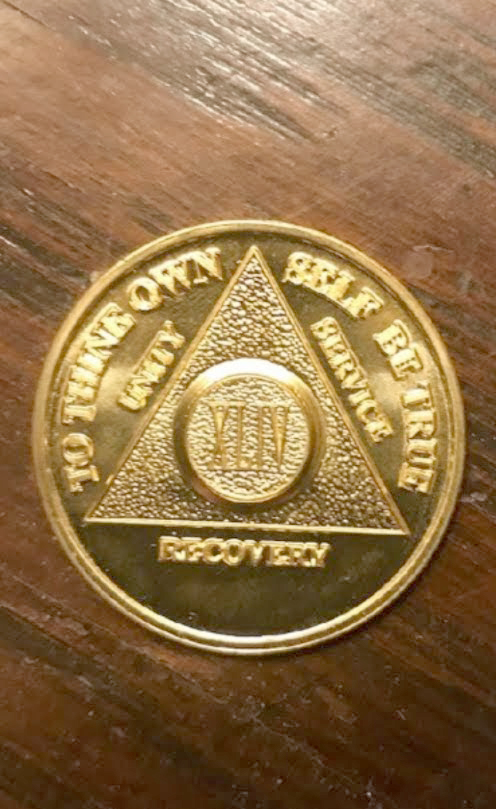As a young boy, George “Bly” Blystone watched his father struggle in the grip of alcoholism. Witnessing drink after drink, Bly’s fear of alcohol grew, and he vowed to never let drinking control him. But within a year of his twenty-first birthday, he was walking down that very road.
“I guess it’s in the genetics,” Bly says of his adopted practices. Although never physically harming anyone, “I was a happy drunk, but I hurt my family emotionally.” Bly didn’t realize what was happening to his life, and even ignored major warning signs– including the loss of his father from alcohol-related conditions. “Dad died at 55, and I still didn’t get it. Drinking cans, I wasn’t an alcoholic. Dad drank bottles.” At least, that’s what he told himself.
Eventually, Bly was confronted by reality– alcohol was robbing him of a good life and would soon rob him of life entirely if a change was not made. He was advised to get help, so he became involved with the Care Center, which provides drug and alcohol counseling services, and is still in existence today, now located at 35 South West Street in Waynesburg. The Care Center then recommended a 28-day program at Gateway Rehab in Aliquippa, PA. “Halfway through, I realized I had a problem,” he explains. Surrender was key for Bly and became the pivotal point in fueling his desire to improve his life.
But the rehab journey didn’t end there. Bly reconnected with the Care Center for continued support and rehabilitation and went on to take a maintenance position at the Greene County Memorial Hospital, simultaneously participating in Alcoholics Anonymous meetings at the hospital. The support Bly received here carried him through the long road of recovery. Finally, alcoholism was seen as a disability, and the right help for breaking the cycle became available. The 16 years Bly dedicated to work at the hospital proved to not only benefit him, but others, providing an avenue to pass the blessings he received on to those around him, and kickstart his reputation as a community servant and an active supporter to many in their personal sobriety journeys. “It was a good job, but it helped me help others,” he states. “I was here, I was well, and I could help!”
Keeping his own story anonymous never felt like an option for Bly. “People like people,” he says; every person has a unique story with unique needs. Sharing his own struggle is Bly’s tool to uplift and inspire those around him, so he began hosting Alcoholics Anonymous meetings of his own, first at the hospital, and then nearby at St. George’s Church in Waynesburg. All the while, he continued to improve.
Sadly, his hospital position was downsized, and Bly took some small jobs before transitioning to Fox Ford Dealership in Waynesburg. He would spend 11 years there before retiring. Toward the end of his time at Fox Ford, Bly spent six months working for Greenbrier, now known as Gateway, another rehab program through the hospital to help individuals regain their lives.
Retirement, however, was only the beginning of Bly’s true career. Realizing that those struggling with alcohol abuse needed an outlet for relationships and support, Bly partnered with other like-minded individuals to create Steps Inside, a recovery clubhouse, which still operates today. Steps Inside is located at 1790 Morris Street in Waynesburg and holds meetings every day but Tuesday. Eventually, this group branched out to create Community Recovery, a system of halfway houses for both men and women. Unfortunately, all the residents were not able to secure jobs to contribute to the cost of the facilities, and the houses were forced to close. Despite this disappointment, Community Recovery did aid many in their own recovery journeys, with Bly’s experiences helping to provide this opportunity. The current goal is to gain enough funds to start new three-quarter or halfway houses in the Greene County area, since there are none accessible to the local community. Bly also became active with Drug Court, helping alcoholics and drug addicts stay out of jail and find housing placements through Human Services.
Bly celebrates his own sobriety by helping others do the same. Taking advantage of each of the groups available to him allowed Bly to build a network of lifelong friends, many of whom are still in daily contact. “People call every day to check in or just keep themselves going,” he says. “You have to understand that the AA program is a way of living.” Alcoholics Anonymous celebrates every year of a participant’s sobriety by awarding an anniversary coin. It is from this program that Bly recently received his gold coin for 44 years of sobriety at a celebratory dinner. But it isn’t just the coin that is golden, but the new life he has built by being constantly encouraged by those around him and doing the same for others. “I just love what I am doing– I love to be alive!”
For more information, connect with Bly at 724-710-4898.
